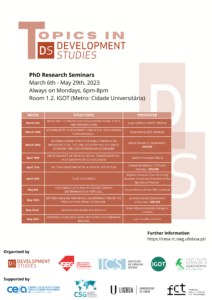CESA

Development Studies Seminars 2023 | April 11th | Transcolonial: O sujeito e o contexto | João Pina-Cabral (ICS/ULisboa)
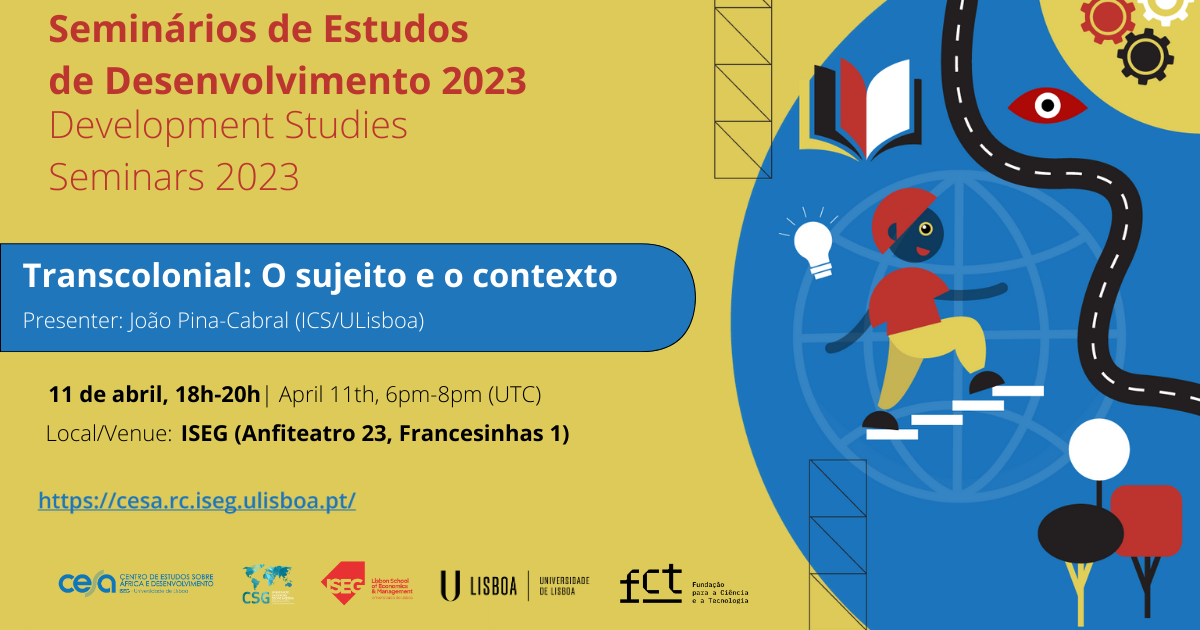
The Center for African and Development Studies (CEsA/CSG/ISEG/ULisboa) and the coordination of the Masters in Development and International Cooperation (MDCI) and the PhD in Development Studies (PDED) courses at ISEG – Lisbon School of Economics and Management, University of Lisbon (ULisboa), invite you to the sixth session of the Development Studies Seminars 2023, which will have as its theme “Transcolonial: O sujeito e o contexto” and will be presented by Intituto de Ciências Sociais of the University of Lisbon’s coordinating researcher João Pina-Cabral on April 11th, 2023, from 6 pm to 8 pm (UTC+0), at ISEG (Anfiteatro 23, Francesinhas 1, 1200-781, Lisbon, Portugal).
REGISTER HERE: https://www.eventbrite.com/e/bilhetes-seminarios-de-estudos-de-desenvolvimento-2023-com-joao-pina-cabral-ics-579244354457
The session will be based on the book by João Pina-Cabral, “Transcolonial”, released in March 2023. Book presentation text:
“Are the Portuguese really fish-cannibals as the Mozambicans thought? After all, who eats who? What sense do these narratives about the circulation of bodily substances that are found all over the world where there were Portuguese? Arriving in Mozambique, after more than two decades of absence, I realized that I carried within myself signs that triggered in my hosts a feeling of transcolonial familiarity that was not always pleasant. In this book, I bring together a series of essays where I analyze the tortuous journeys of transcoloniality, that is, the spaces where empires and hegemonies intersect and where people and groups move within global capitalism.“
About the event
The Development Studies Seminars 2023 are an initiative that, since 1991, promotes research carried out in the areas of study of MDCI/ISEG/ULisboa and PDED/ISEG/ULisboa. The 2023 edition will take place from February 28 2023, always on Tuesdays, from 6 pm to 8 pm (UTC), at ISEG (Anfiteatro 23, Francesinhas 1, 1200-781, Lisbon, Portugal). Sessions will be in a face-to-face format and with free admission. We recommend prior registration on the CEsA profile on EventBrite (click here), but the capacity of the amphitheater will be filled in order of arrival.
Sixth session of the Development Studies Seminars 2023
Theme: Transcolonial: O sujeito e o contexto
Presenter: João Pina-Cabral (ICS/ULisboa)
Date and time: April 11th, 2023, always on Tuesdays, from 6 pm to 8 pm (UTC+0)
In-person event at ISEG (Anfiteatro 23, Francesinhas 1, 1200-781, Lisbon, Portugal)

Related content:
- Book “Transcolonial” (João Pina-Cabral), launched on March 2nd: https://www.ics.ulisboa.pt/livros/transcolonial
Read more:
Development Studies Seminars 2023 will return on February 28 at ISEG
Playlist “Development Studies Seminars 2023” on CEsA’s YouTube channel
Did you miss a session? Watch all Development Studies Seminars 2022 presentations
Applications for the 2023/24 PhD in Development Studies (PDED) are open
Author: CEsA Communication (comunicacao@cesa.iseg.ulisboa.pt)
Image: CEsA/Reproduction

Development Studies Seminars 2023 | March 21st | Achieving Human and Ecological Well-Being Through SDGs: The Iran Case | Mojgan Chapariha (CUSP/University of Surrey)
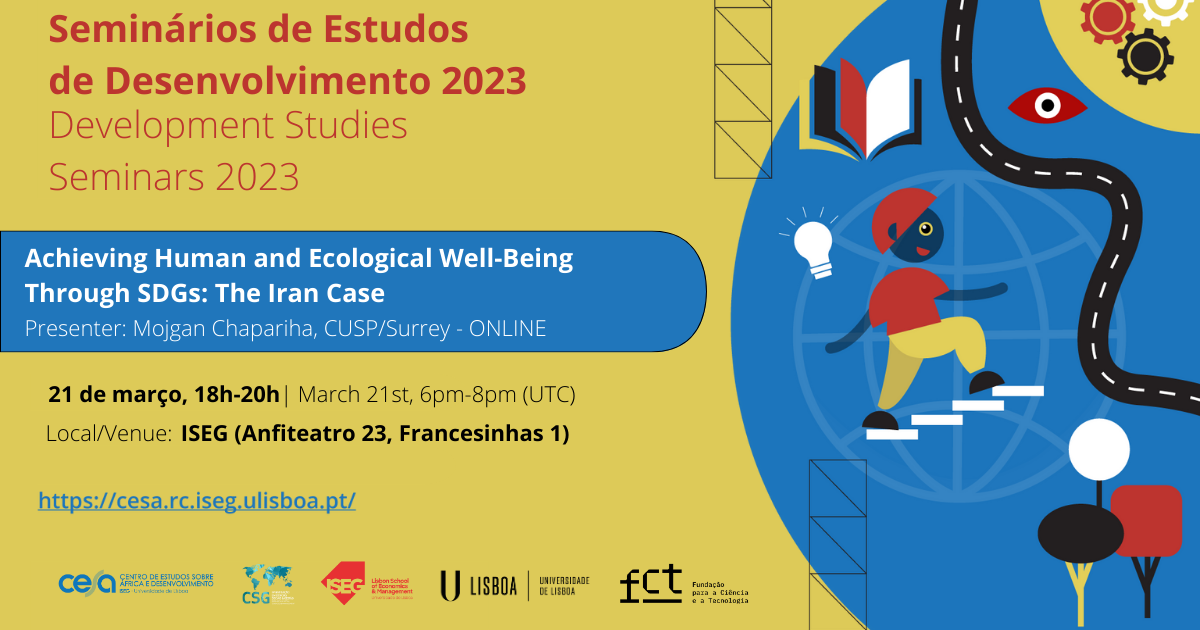
The Center for African and Development Studies (CEsA/CSG/ISEG/ULisboa) and the coordination of the Masters in Development and International Cooperation (MDCI) and the PhD in Development Studies (PDED) courses at ISEG – Lisbon School of Economics and Management, University of Lisbon (ULisboa), invite you to the fourth session of the Development Studies Seminars 2023, which will have as its theme “Achieving Human and Ecological Well-Being Through SDGs: The Iran Case” and will be presented by University of Surrey’s researcher Mojgan Chapariha (online) on March 21st, 2023, from 6 pm to 8 pm (UTC+0), at ISEG (Anfiteatro 23, Francesinhas 1, 1200-781, Lisbon, Portugal).
REGISTER HERE: https://www.eventbrite.com/e/bilhetes-seminarios-de-estudos-de-desenvolvimento-2023-com-mojgan-chapariha-surrey-579146371387
About the event
The Development Studies Seminars 2023 are an initiative that, since 1991, promotes research carried out in the areas of study of MDCI/ISEG/ULisboa and PDED/ISEG/ULisboa. The 2023 edition will take place from February 28 2023, always on Tuesdays, from 6 pm to 8 pm (UTC), at ISEG (Anfiteatro 23, Francesinhas 1, 1200-781, Lisbon, Portugal). Sessions will be presented in English, in a face-to-face format and with free admission. We recommend prior registration on the CEsA profile on EventBrite (click here), but the capacity of the amphitheater will be filled in order of arrival.
Fourth session of the Development Studies Seminars 2023
Theme: Achieving Human and Ecological Well-Being Through SDGs: The Iran Case
Presenter: Mojgan Chapariha (Centre for the Understanding of Sustainable Prosperity, University of Surrey) – ONLINE
Date and time: March 28, 2023, always on Tuesdays, from 6 pm to 8 pm (UTC+0)
In-person event at ISEG (Anfiteatro 23, Francesinhas 1, 1200-781, Lisbon, Portugal)
Some related content:
- PhD thesis: “Achieving human and ecological well-being through sustainable development goals (SDGs): a case study of Iran” (Mojgan Chapariha): https://www.repository.utl.pt/handle/10400.5/23974
- “Meeting SDGs in Iran” (Mojgan Chapariha): https://exchange.iseesystems.com/public/mojgan-chapariha/meeting-sdgs-in-iran/index.html#page1
- Working Paper n 147/2016: “The potential of sustainable development goals in enhancing well-being of elderly people through green public spaces”
- (Mojgan Chapariha): https://www.repository.utl.pt/handle/10400.5/12598
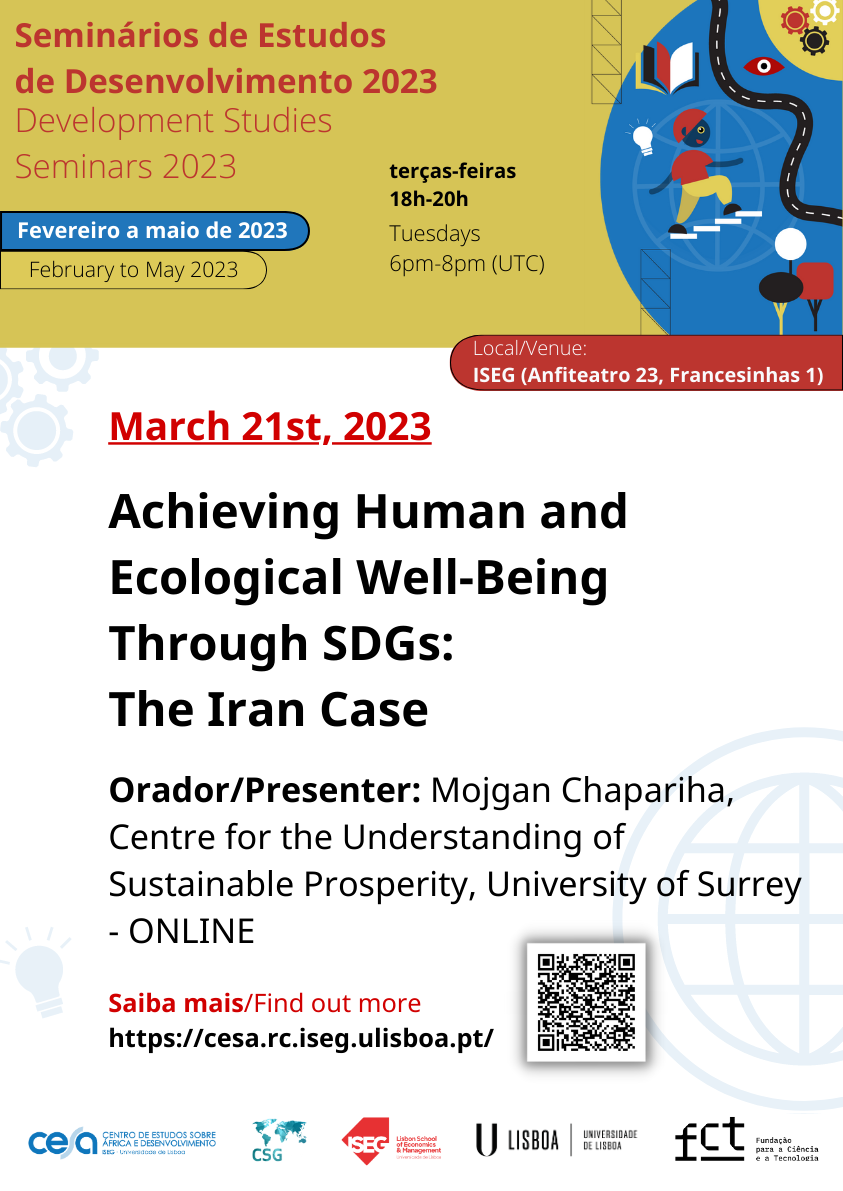
Read more:
Development Studies Seminars 2023 will return on February 28 at ISEG
Playlist “Development Studies Seminars 2023” on CEsA’s YouTube channel
Did you miss a session? Watch all Development Studies Seminars 2022 presentations
Applications for the 2023/24 PhD in Development Studies (PDED) are open
Author: CEsA Communication (comunicacao@cesa.iseg.ulisboa.pt)
Image: CEsA/Reproduction
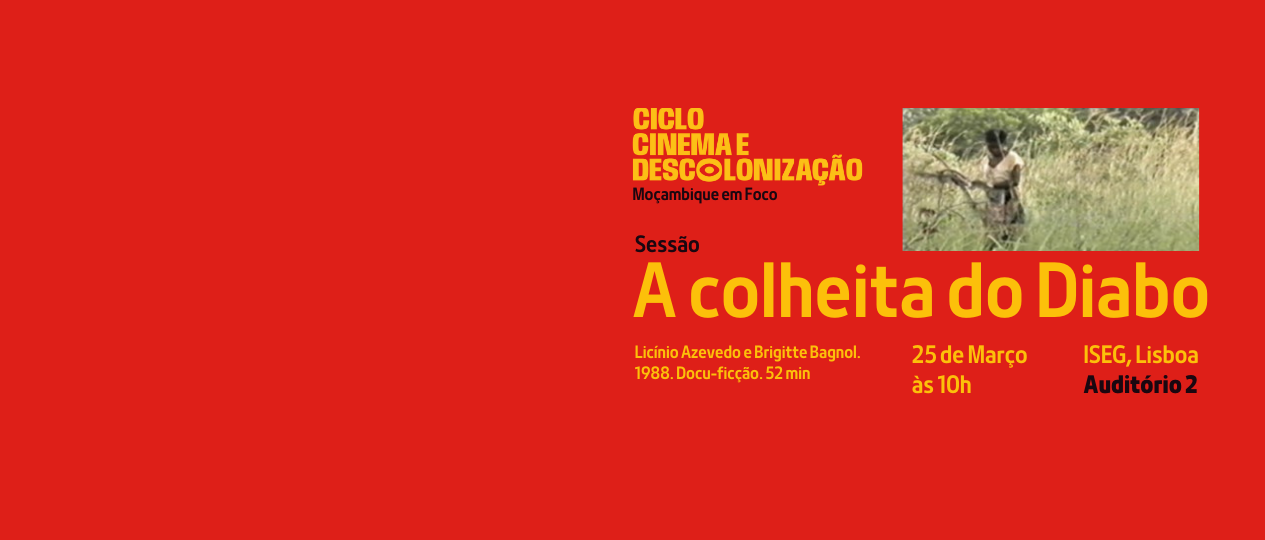
Ciclo de Cinema e Descolonização: Moçambique em foco | March 25th | The Devil’s Harvest (“A colheita do Diabo”) | Discussion panel with Brigitte Bagnol (online)
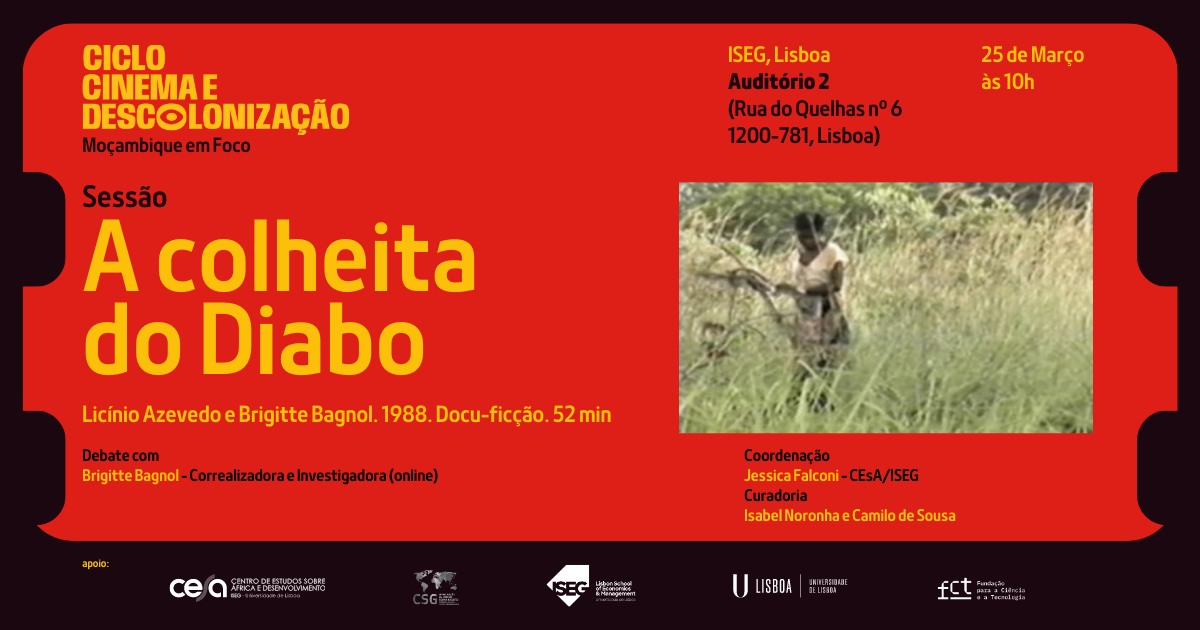
The Centre for African and Development Studies (CEsA/CSG/ISEG/ULisboa), within the scope of the “Ciclo de Cinema e Descolonização: Moçambique em foco”, is pleased to announce the screening of The Devil’s Harvest (“A colheita do Diabo” in Portuguese) (Licínio Azevedo e Brigitte Bagnol, 1988, Docufiction, 52 min, Portuguese). The session is free admission and will take place on March 25, 10 am, at ISEG – Lisbon School of Economics and Management (Auditorium 2, Rua do Quelhas n. 6, 1200-781, Lisbon, Portugal).
The film will be played in Portuguese. We recommend a pre-registration (click here to register), but the capacity of the auditorium will be filled in order of arrival.
The debate will follow with co-director and researcher Brigitte Bagnol (online).
Synopsis for “The Devil’s Harvest”
First Mozambican feature film made on video by Brigitte Bagnol and Licínio Azevedo in 1988, “The Devil’s Harvest” mix reality and fiction, as well as professional and non-professional actors. Among the first images, dedicated to the importance of cinema, and the tragic, real and announced episodes, the film portrays the daily life of a small rural community threatened by drought and armed attacks by “bandits”, defended by a group of veterans of the national liberation struggle.
Click on the imagem below to access the film sheet:
About the “Ciclo de Cinema e Descolonização: Moçambique em foco”
The project urges to understand decolonization as a process still in progress, which must be accepted and integrated into the social, political, cultural and personal dynamics. The project aims to create an open and dynamic space for sharing, where memories, narratives, dialogues and reflections can emerge. It is coordinated by Jessica Falconi (CEsA/CSG/ISEG/ULisboa) and curated by the Mozambican filmmakers Isabel Noronha and Camilo de Sousa.
The film club will take place from January to July 2023, with screenings once a month, always on Saturdays, where it is intended to debate and reflect on the legacies and memories of decolonization in Mozambique. Each session will have the spoken remarks of producers, directors, etc., as well as moderators and debaters who will facilitate the debate within the audience.
Coordination: Jessica Falconi (CEsA/CSG/ISEG/ULisboa)
Curators: Isabel Noronha and Camilo de Sousa
Scientific consultancy: Joana Pereira Leite (CEsA/CSG/ISEG/ULisboa) and Ana Mafalda Leite (CEsA/CSG/ISEG/ULisboa)
Support: CEsA/CSG/ISEG/ULisboa
Check the full program for 2023 of the film club “Cinema e Descolonização: Moçambique em foco”
Author: CEsA Communication (comunicacao@cesa.iseg.ulisboa.pt)
Image: CEsA/Reproduction

Development Studies Seminars 2023 | March 28th | A Discussion of the Grammars and Languages of Regionalisms in the Wake of COVID-19 Pandemic and the War in Ukraine | Daniel Bach (Sciences Po Bordeaux)
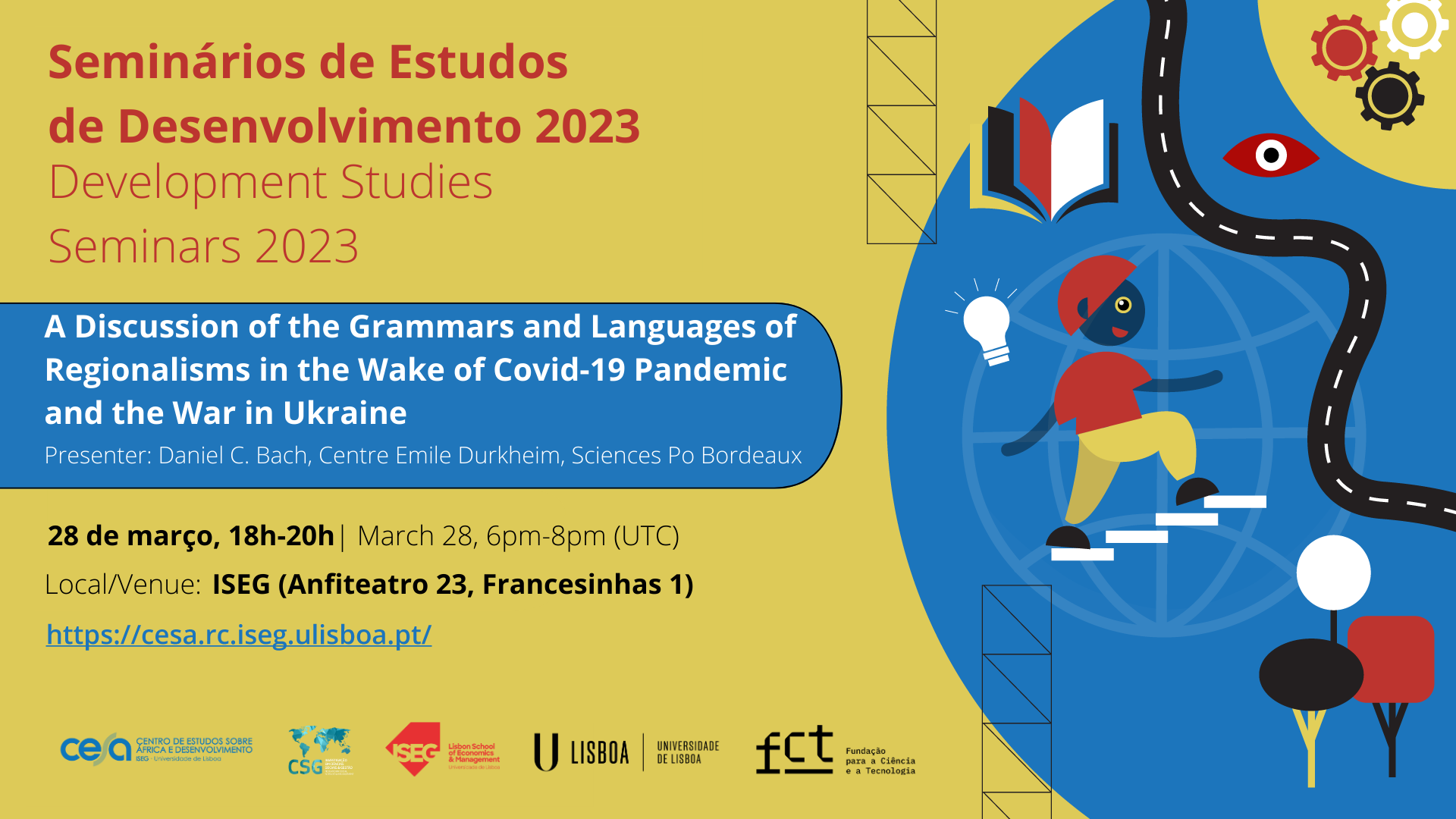
The Center for African and Development Studies (CEsA/CSG/ISEG/ULisboa) and the coordination of the Masters in Development and International Cooperation (MDCI) and the PhD in Development Studies (PDED) courses at ISEG – Lisbon School of Economics and Management, University of Lisbon (ULisboa), invite you to the fifth session of the Development Studies Seminars 2023, which will have as its theme “A Discussion of the Grammars and Languages of Regionalisms in the Wake of COVID-19 Pandemic and the War in Ukraine” and will be presented by Sciences Po Bordeaux and CEsA’s researcher Daniel Bach on March 28th, 2023, from 6 pm to 8 pm (UTC+0), at ISEG (Anfiteatro 23, Francesinhas 1, 1200-781, Lisbon, Portugal).
REGISTER HERE: https://www.eventbrite.com/e/seminarios-de-estudos-de-desenvolvimento-2023-com-daniel-bach-science-po-tickets-569835040947
About the event
The Development Studies Seminars 2023 are an initiative that, since 1991, promotes research carried out in the areas of study of MDCI/ISEG/ULisboa and PDED/ISEG/ULisboa. The 2023 edition will take place from February 28 2023, always on Tuesdays, from 6 pm to 8 pm (UTC), at ISEG (Anfiteatro 23, Francesinhas 1, 1200-781, Lisbon, Portugal). Sessions will be presented in English, in a face-to-face format and with free admission. We recommend prior registration on the CEsA profile on EventBrite (click here), but the capacity of the amphitheater will be filled in order of arrival.
Fifth session of the Development Studies Seminars 2023
Theme: A Discussion of the Grammars and Languages of Regionalisms in the Wake of COVID-19 Pandemic and the War in Ukraine
Presenter: Daniel Bach (Sciences Po Bordeaux and CEsA)
Date and time: March 28, 2023, always on Tuesdays, from 6 pm to 8 pm (UTC+0)
In-person event at ISEG (Anfiteatro 23, Francesinhas 1, 1200-781, Lisbon, Portugal)
Related content:
- Book “Regionalism in Africa: Genealogies, institutions and trans-state networks” (Daniel Bach): https://www.routledge.com/Regionalism-in-Africa-Genealogies-institutions-and-trans-state-networks/Bach/p/book/9781138091054
- Chapter “The Languages and Grammar of Regionalism”, The Palgrave Handbook of African Political Economy (Daniel Bach): https://link.springer.com/chapter/10.1007/978-3-030-38922-2_52
- Daniel Bach’s researcher profiles: https://cesa.rc.iseg.ulisboa.pt/investigacao/investigadores/dbach/ e https://www.centreemiledurkheim.fr/notre-equipe/daniel-bach/
- Working Paper n. 56/1999: The revival of regional integration in Africa (Daniel Bach): https://www.repository.utl.pt/handle/10400.5/1377

Read more:
Development Studies Seminars 2023 will return on February 28 at ISEG
Playlist “Development Studies Seminars 2023” on CEsA’s YouTube channel
Did you miss a session? Watch all Development Studies Seminars 2022 presentations
Applications for the 2023/24 PhD in Development Studies (PDED) are open
Author: CEsA Communication (comunicacao@cesa.iseg.ulisboa.pt)
Image: CEsA/Reproduction

Development Studies Seminars 2023 | March 14th | The Tourism Chain Value as a Strategic Development Element in Angola Under the PRODESI Programme | Eduardo Sarmento (CEsA/CSG/ISEG/ULisboa)
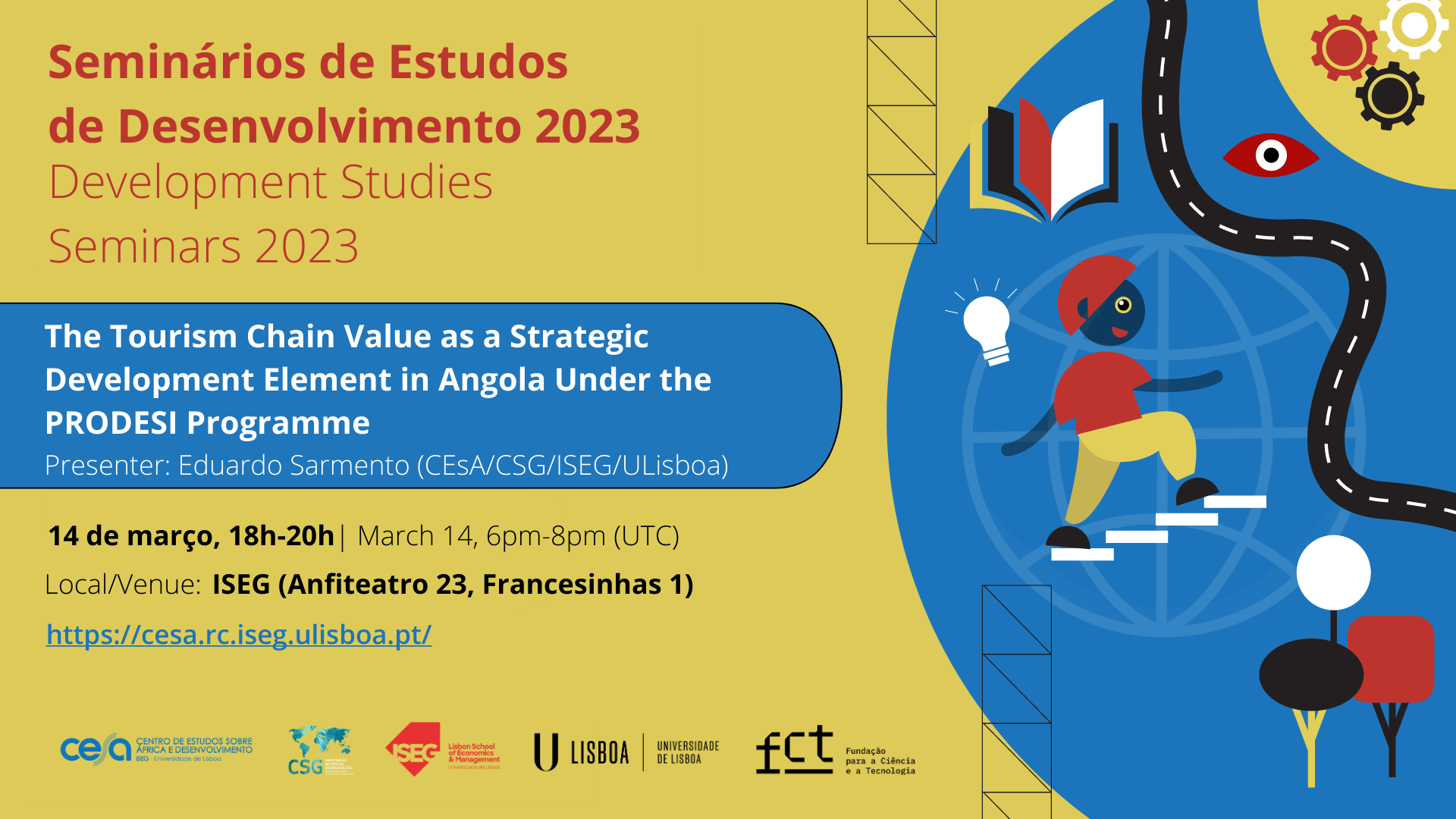
The Center for African and Development Studies (CEsA/CSG/ISEG/ULisboa) and the coordination of the Masters in Development and International Cooperation (MDCI) and the PhD in Development Studies (PDED) courses at ISEG – Lisbon School of Economics and Management, University of Lisbon (ULisboa), invite you to the second session of the Development Studies Seminars 2023, which will have as its theme “The Tourism Chain Value as a Strategic Development Element in Angola Under the PRODESI Programme” and will be presented by CEsA researcher Eduardo Sarmento on March 14th, 2023, from 6 pm to 8 pm (UTC+0), at ISEG (Anfiteatro 23, Francesinhas 1, 1200-781, Lisbon, Portugal).
REGISTER HERE: https://www.eventbrite.com/e/seminarios-de-estudos-de-desenvolvimento-2023-com-eduardo-sarmento-cesa-tickets-569797578897
About the event
The Seminars are an initiative that, since 1991, promotes research carried out in the areas of study of MDCI/ISEG/ULisboa and PDED/ISEG/ULisboa. The 2023 edition will take place from February 28 2023, always on Tuesdays, from 6 pm to 8 pm (UTC), at ISEG (Anfiteatro 23, Francesinhas 1, 1200-781, Lisbon, Portugal). Sessions will be presented in English, in a face-to-face format and with free admission. We recommend prior registration on the CEsA profile on EventBrite (click here), but the capacity of the amphitheater will be filled in order of arrival.
Third session of the Development Studies Seminars 2023
Theme: The Tourism Chain Value as a Strategic Development Element in Angola Under the PRODESI Programme
Presenter: Eduardo Sarmento (CEsA/CSG/ISEG/ULisboa)
Date and time: March 14, 2023, always on Tuesdays, from 6 pm to 8 pm (UTC+0)
In-person event at ISEG (Anfiteatro 23, Francesinhas 1, 1200-781, Lisbon, Portugal)
Some related content:
- Working Paper n. 190/2023: “Study of the value chain of the tourism sector in Angola as an alternative economic, social, and environmental development strategy under the Prodesi programme” (Eduardo Sarmento): https://www.repository.utl.pt/handle/10400.5/27342
- Eduardo Sarmento’s Researcher profile: https://cesa.rc.iseg.ulisboa.pt/investigacao/investigadores/esarmento/
- Eduardo Sarmento’s publications:
- Article: “Challenges of a small insular developing state: Cape Verde”: https://www.repository.utl.pt/handle/10400.5/26056
- Article: “Exploring the role of norms and habit in explaining pro‐environmental behavior intentions in situations of use robots and AI agents as providers in tourism sector”: https://www.repository.utl.pt/handle/10400.5/26057

Read more:
Development Studies Seminars 2023 will return on February 28 at ISEG
Playlist “Development Studies Seminars 2023” on CEsA’s YouTube channel
Did you miss a session? Watch all Development Studies Seminars 2022 presentations
Applications for the 2023/24 PhD in Development Studies (PDED) are open
Author: CEsA Communication (comunicacao@cesa.iseg.ulisboa.pt)
Image: CEsA/Reproduction

Development Studies Seminars 2023 | March 7th | Wealthy Continent, Poor People: Pathology of mis-governance in contemporary Africa | Jacob Audu (Ahmadu Bello University)
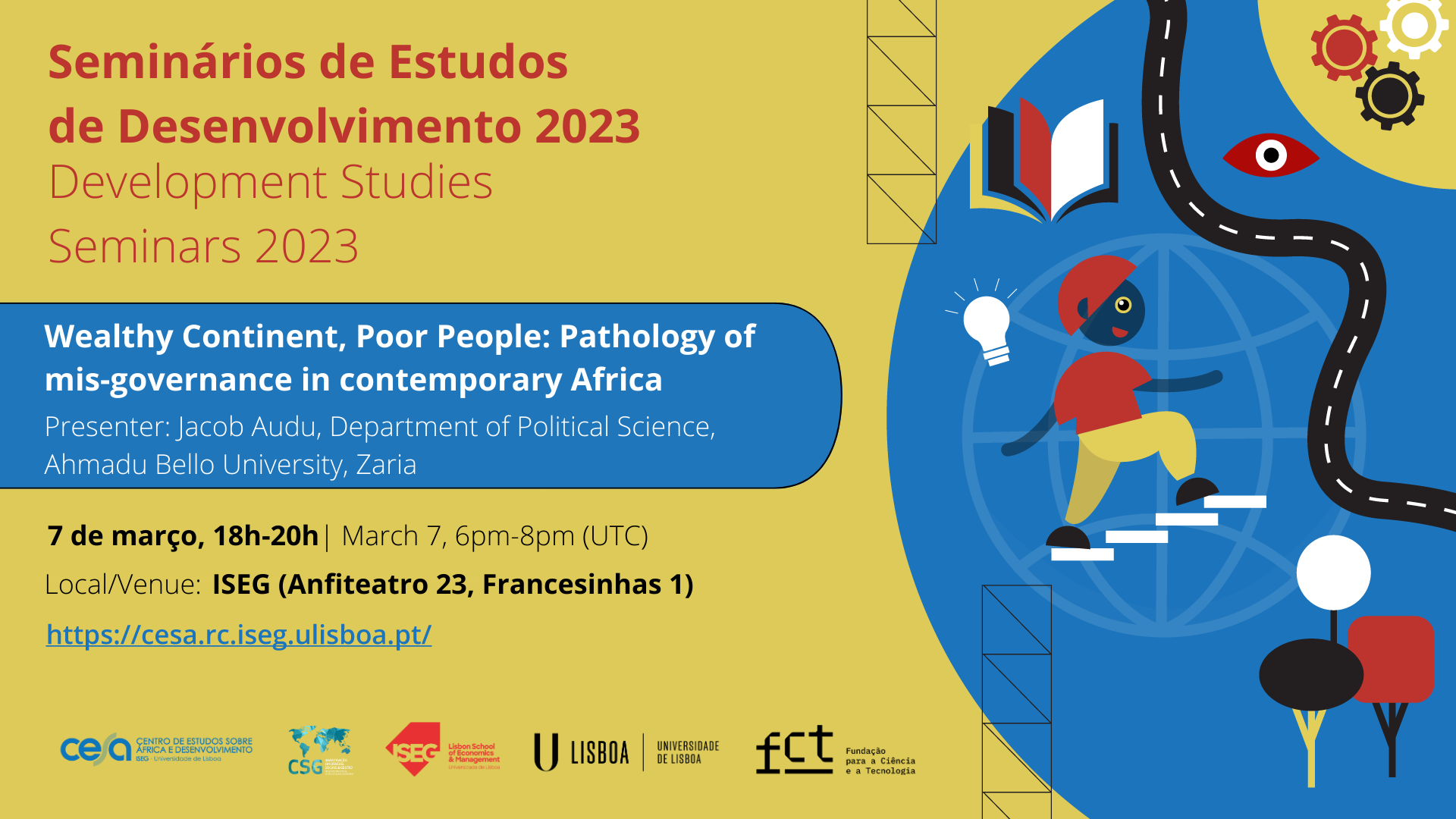
The Center for African and Development Studies (CEsA/CSG/ISEG/ULisboa) and the coordination of the Masters in Development and International Cooperation (MDCI) and the PhD in Development Studies (PDED) courses at ISEG – Lisbon School of Economics and Management, University of Lisbon (ULisboa), invite you to the second session of the Development Studies Seminars 2023, which will have as its theme “Wealthy Continent, Poor People: Pathology of mis-governance in contemporary Africa” and will be presented by Ahmadu Bello University’s researcher Jacob Audu on March 7th, 2023, from 6 pm to 8 pm (UTC+0), at ISEG (Anfiteatro 23, Francesinhas 1, 1200-781, Lisbon, Portugal).
REGISTER HERE: https://www.eventbrite.com/e/seminarios-de-estudos-de-desenvolvimento-2023-com-jacob-audu-ahmadu-bello-tickets-569778100637
About the event
The Seminars are an initiative that, since 1991, promotes research carried out in the areas of study of MDCI/ISEG/ULisboa and PDED/ISEG/ULisboa. The 2023 edition will take place from February 28 2023, always on Tuesdays, from 6 pm to 8 pm (UTC), at ISEG (Anfiteatro 23, Francesinhas 1, 1200-781, Lisbon, Portugal). Sessions will be presented in English, in a face-to-face format and with free admission. We recommend prior registration on the CEsA profile on EventBrite (click here), but the capacity of the amphitheater will be filled in order of arrival.
Second session of the Development Studies Seminars 2023
Theme: Wealthy Continent, Poor People: Pathology of mis-governance in contemporary Africa
Presenter: Jacob Audu (Ahmadu Bello University)
Date and time: March 7, 2023, always on Tuesdays, from 6 pm to 8 pm (UTC+0)
In-person event at ISEG (Anfiteatro 23, Francesinhas 1, 1200-781, Lisbon, Portugal)
Read more:
Development Studies Seminars 2023 will return on February 28 at ISEG
Playlist “Development Studies Seminars 2023” on CEsA’s YouTube channel
Did you miss a session? Watch all Development Studies Seminars 2022 presentations
Applications for the 2023/24 PhD in Development Studies (PDED) are open
Author: CEsA Communication (comunicacao@cesa.iseg.ulisboa.pt)
Image: CEsA/Reproduction
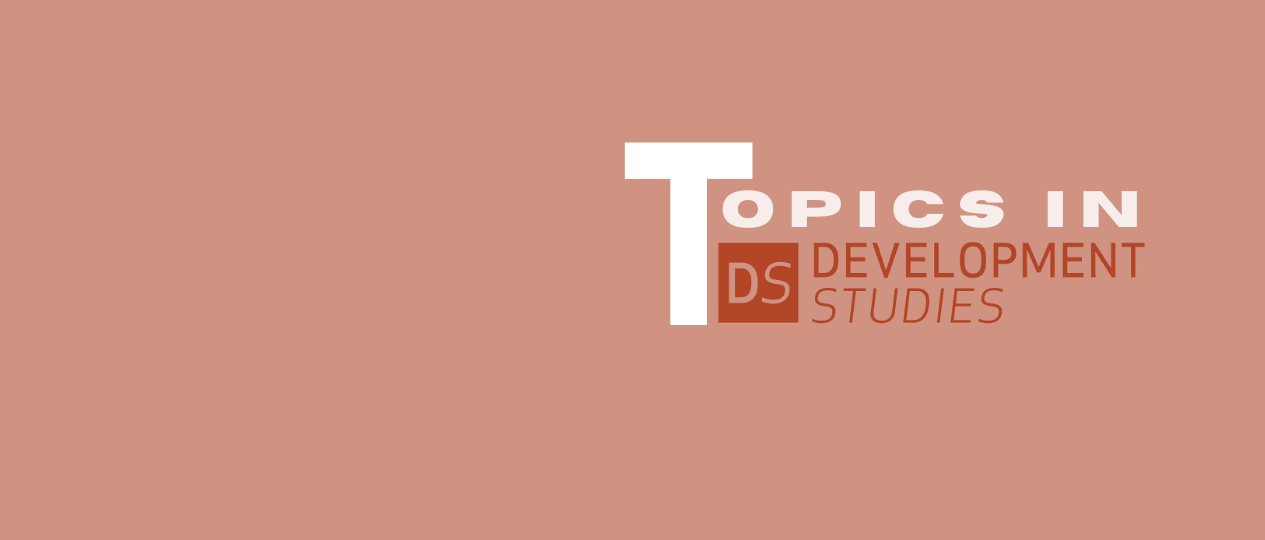
“Topics in Development Studies” 2023 | May 29th | Growing Knowledge-Based Industries in Peripheral Regions | Luís Carvalho (UPorto)
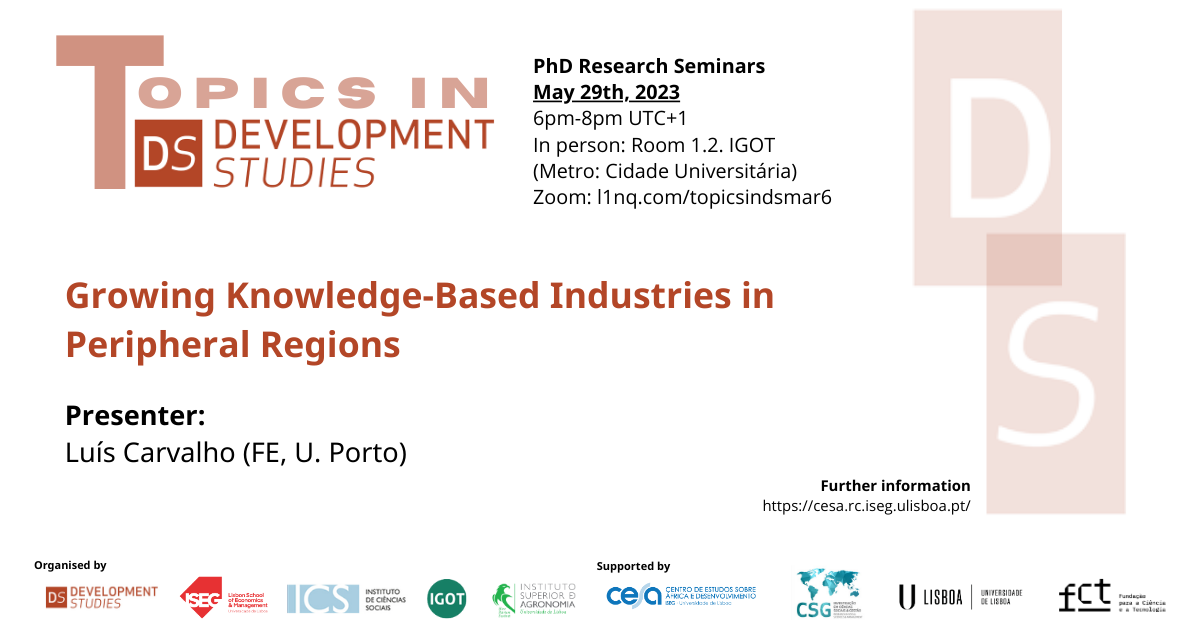
The Center for African and Development Studies (CEsA/CSG/ISEG/ULisboa) and the coordination of the PhD in Development Studies (PDED) invite you to the tenth session of the cycle of seminars “Topics in Development Studies 2023”, which will have as its theme “Growing Knowledge-Based Industries in Peripheral Regions” and will be presented by Universidade do Porto’s researcher Luís Carvalho on May 29th, 2023, from 6 pm to 8 pm (UTC+1), at Room 1.2. at IGOT (Rua Branca Edmée Marques, Edifício IGOT, Cidade Universitária, 1600-276 Lisboa; Estação do metro: Cidade Universitária). Link Zoom: https://videoconf-colibri.zoom.us/j/97896355770?pwd=SHV5TTZoV2NZaXUxSnBoV2JOaDBnZz09.
About the event
The Seminars promote in-depth and advanced discussions on Development Studies and are an initiative within the scope of the PDED. The PhD is a joint program between ISEG – Lisbon School of Economics and Management, ISA – Instituto Superior de Agronomia, ICS – Instituto de Ciências Sociais, and IGOT – Institute of Geography and Land Planning.
Seminars will take place from March 6th to June 5th, 2023, always on Mondays, from 6 pm to 8 pm (UTC+1), at Room 1.2. at IGOT (Rua Branca Edmée Marques, Edifício IGOT, Cidade Universitária, 1600-276 Lisboa; Estação do metro: Cidade Universitária). The 10 sessions will be in a hybrid format (in person and online) and with free admission.
Tenth session of the “Topics in Development Studies 2023” Seminars
Theme: Growing Knowledge-Based Industries in Peripheral Regions
Presenter: Luís Carvalho (Universidade do Porto)
Date and time: May 29th 2023 (Monday), from 6pm to 8pm (UTC+1)
Hybrid event and with free admission
In person at Room 1.2. at IGOT (Rua Branca Edmée Marques, Edifício IGOT, Cidade Universitária, 1600-276 Lisboa; Estação do metro: Cidade Universitária)
Link Zoom: https://videoconf-colibri.zoom.us/j/97896355770?pwd=SHV5TTZoV2NZaXUxSnBoV2JOaDBnZz09
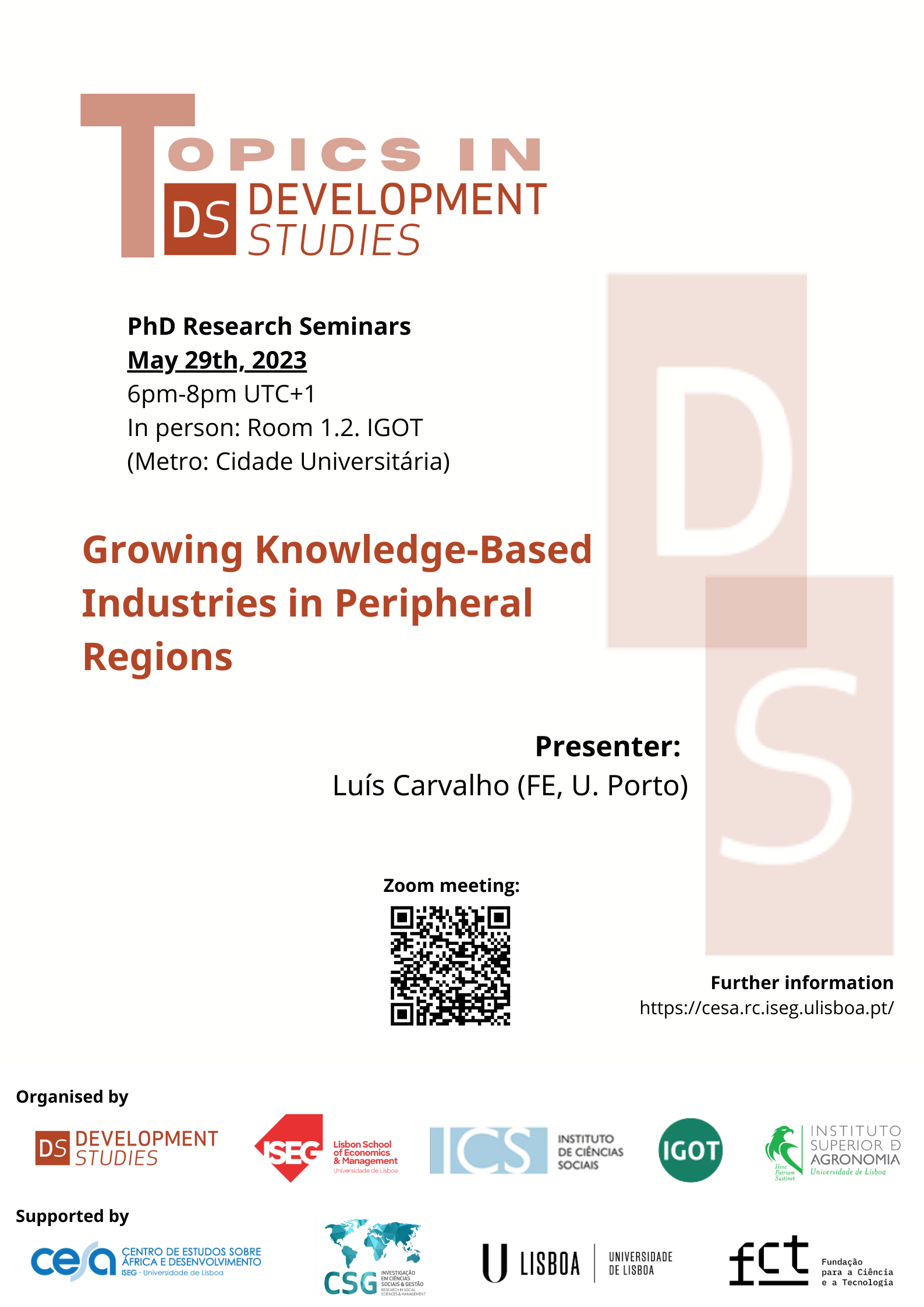
Click on the image below to access the programme
Read more:
Playlist “Topics in Development Studies 2022” on CEsA’s YouTube channel
Author: CEsA Communication (comunicacao@cesa.iseg.ulisboa.pt)
Image: CEsA/Reproduction

“Topics in Development Studies” 2023 | May 22nd | Food (In)Security and its Socioeconomic Determinants in Portugal | Susana Brissos (CEsA/CSG/ISEG/ULisboa)
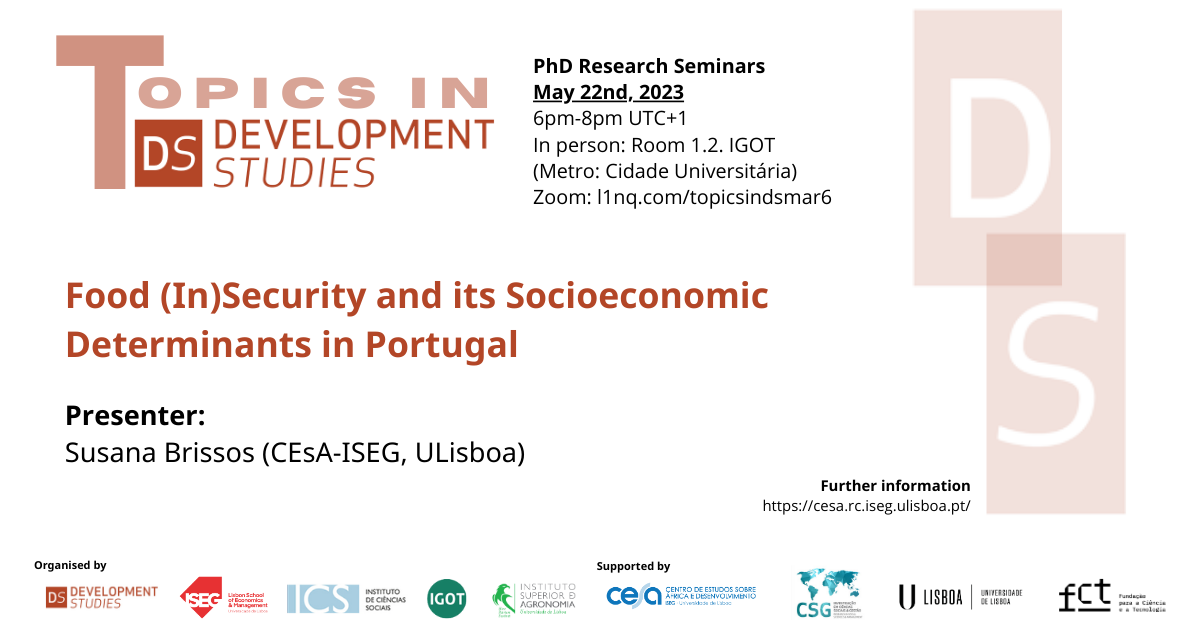
The Center for African and Development Studies (CEsA/CSG/ISEG/ULisboa) and the coordination of the PhD in Development Studies (PDED) invite you to the ninth session of the cycle of seminars “Topics in Development Studies 2023”, which will have as its theme “Food (In)Security and its Socioeconomic Determinants in Portugal” and will be presented by CEsA researcher Susana Brissos on May 22nd, 2023, from 6 pm to 8 pm (UTC+1), at Room 1.2. at IGOT (Rua Branca Edmée Marques, Edifício IGOT, Cidade Universitária, 1600-276 Lisboa; Estação do metro: Cidade Universitária). Link Zoom: https://videoconf-colibri.zoom.us/j/97896355770?pwd=SHV5TTZoV2NZaXUxSnBoV2JOaDBnZz09.
About the event
The Seminars promote in-depth and advanced discussions on Development Studies and are an initiative within the scope of the PDED. The PhD is a joint program between ISEG – Lisbon School of Economics and Management, ISA – Instituto Superior de Agronomia, ICS – Instituto de Ciências Sociais, and IGOT – Institute of Geography and Land Planning.
Seminars will take place from March 6th to June 5th, 2023, always on Mondays, from 6 pm to 8 pm (UTC+1), at Room 1.2. at IGOT (Rua Branca Edmée Marques, Edifício IGOT, Cidade Universitária, 1600-276 Lisboa; Estação do metro: Cidade Universitária). The 10 sessions will be in a hybrid format (in person and online) and with free admission.
Ninth session of the “Topics in Development Studies 2023” Seminars
Theme: Food (In)Security and its Socioeconomic Determinants in Portugal
Presenter: Susana Brissos (CEsA/CSG/ISEG/ULisboa)
Date and time: May 22nd 2023 (Monday), from 6pm to 8pm (UTC+1)
Hybrid event and with free admission
In person at Room 1.2. at IGOT (Rua Branca Edmée Marques, Edifício IGOT, Cidade Universitária, 1600-276 Lisboa; Estação do metro: Cidade Universitária)
Link Zoom: https://videoconf-colibri.zoom.us/j/97896355770?pwd=SHV5TTZoV2NZaXUxSnBoV2JOaDBnZz09
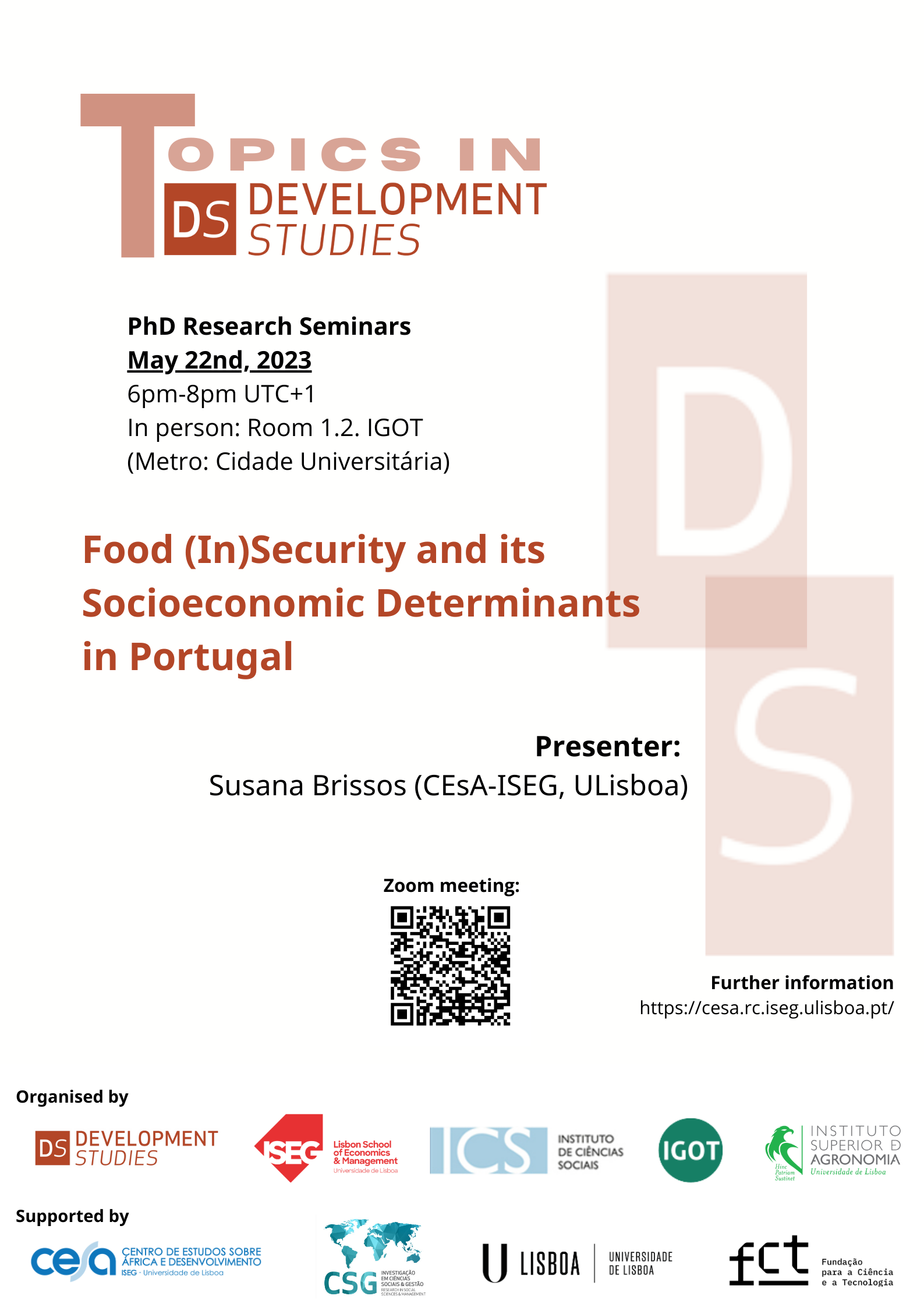
Click on the image below to access the programme
Read more:
Playlist “Topics in Development Studies 2022” on CEsA’s YouTube channel
Author: CEsA Communication (comunicacao@cesa.iseg.ulisboa.pt)
Image: CEsA/Reproduction

“Topics in Development Studies” 2023 | May 15th | Between Realism and Revolt: Governing cities in the crisis of Neoliberal Globalism | Jonathan Davies (De Montfort University)
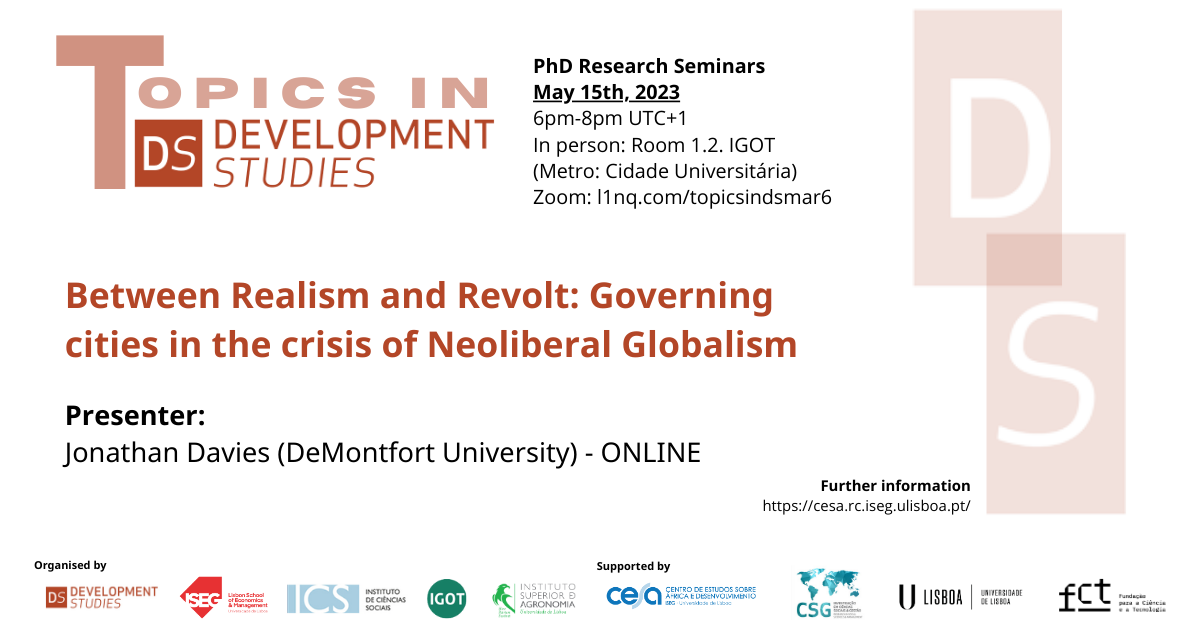
The Center for African and Development Studies (CEsA/CSG/ISEG/ULisboa) and the coordination of the PhD in Development Studies (PDED) invite you to the eighth session of the cycle of seminars “Topics in Development Studies 2023”, which will have as its theme “Between Realism and Revolt: Governing cities in the crisis of Neoliberal Globalism” and will be presented by De Montfort University’s researcher Jonathan Davies (online participation) on May 15th, 2023, from 6 pm to 8 pm (UTC+1), at Room 1.2. at IGOT (Rua Branca Edmée Marques, Edifício IGOT, Cidade Universitária, 1600-276 Lisboa; Estação do metro: Cidade Universitária). Link Zoom: https://videoconf-colibri.zoom.us/j/97896355770?pwd=SHV5TTZoV2NZaXUxSnBoV2JOaDBnZz09.
About the event
The Seminars promote in-depth and advanced discussions on Development Studies and are an initiative within the scope of the PDED. The PhD is a joint program between ISEG – Lisbon School of Economics and Management, ISA – Instituto Superior de Agronomia, ICS – Instituto de Ciências Sociais, and IGOT – Institute of Geography and Land Planning.
Seminars will take place from March 6th to June 5th, 2023, always on Mondays, from 6 pm to 8 pm (UTC+1), at Room 1.2. at IGOT (Rua Branca Edmée Marques, Edifício IGOT, Cidade Universitária, 1600-276 Lisboa; Estação do metro: Cidade Universitária). The 10 sessions will be in a hybrid format (in person and online) and with free admission.
Eighth session of the “Topics in Development Studies 2023” Seminars
Theme: Between Realism and Revolt: Governing cities in the crisis of Neoliberal Globalism
Presenter: Jonathan Davies (De Montfort University) – ONLINE
Date and time: May 15th 2023 (Monday), from 6pm to 8pm (UTC+1)
Hybrid event and with free admission
In person at Room 1.2. at IGOT (Rua Branca Edmée Marques, Edifício IGOT, Cidade Universitária, 1600-276 Lisboa; Estação do metro: Cidade Universitária)
Link Zoom: https://videoconf-colibri.zoom.us/j/97896355770?pwd=SHV5TTZoV2NZaXUxSnBoV2JOaDBnZz09
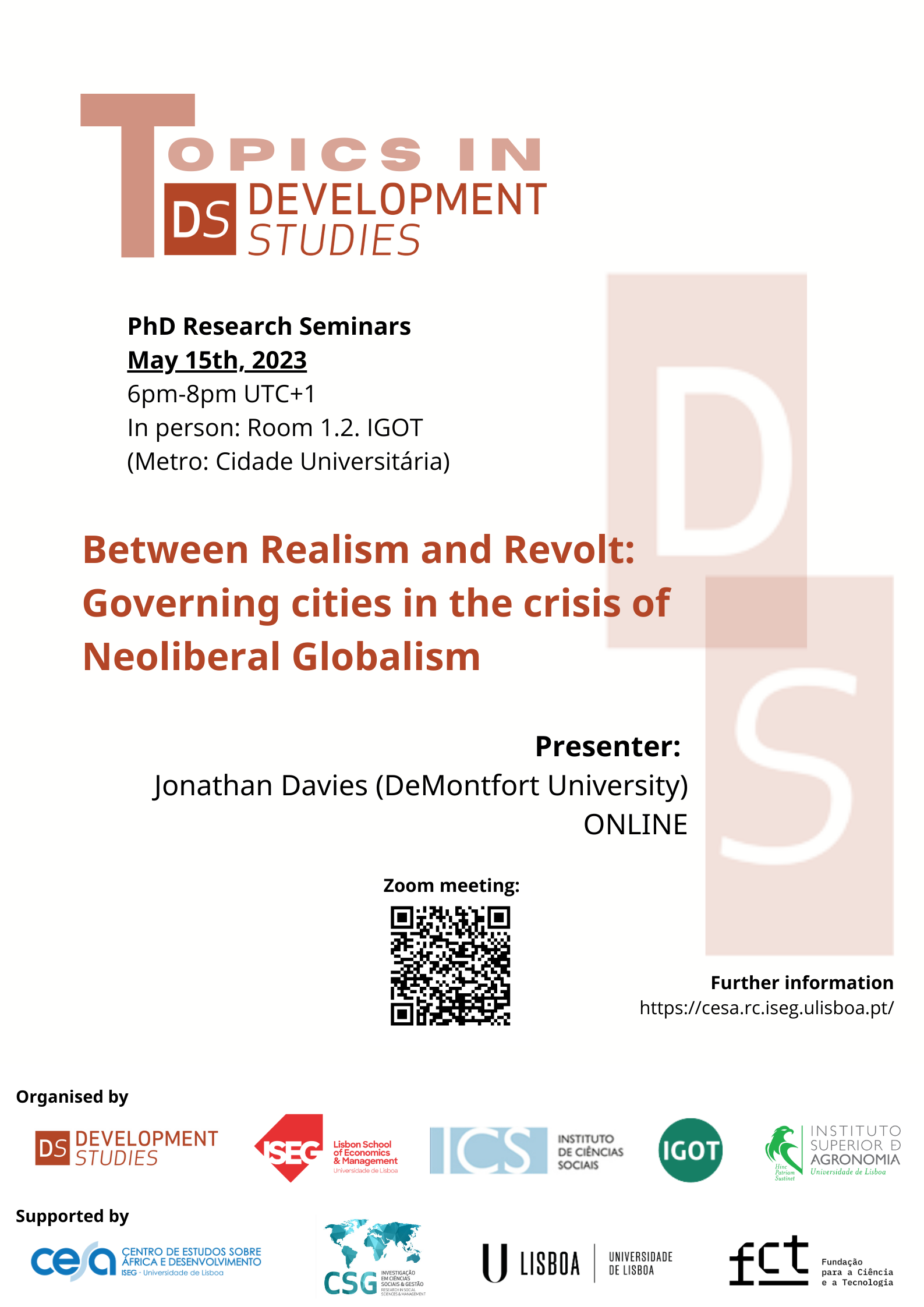
Click on the image below to access the programme
Read more:
Playlist “Topics in Development Studies 2022” on CEsA’s YouTube channel
Author: CEsA Communication (comunicacao@cesa.iseg.ulisboa.pt)
Image: CEsA/Reproduction

“Topics in Development Studies” 2023 | May 8th | Housing: A machine for accumulation of capital or redistribution of resources? | Sonia Arbaci (University College London)
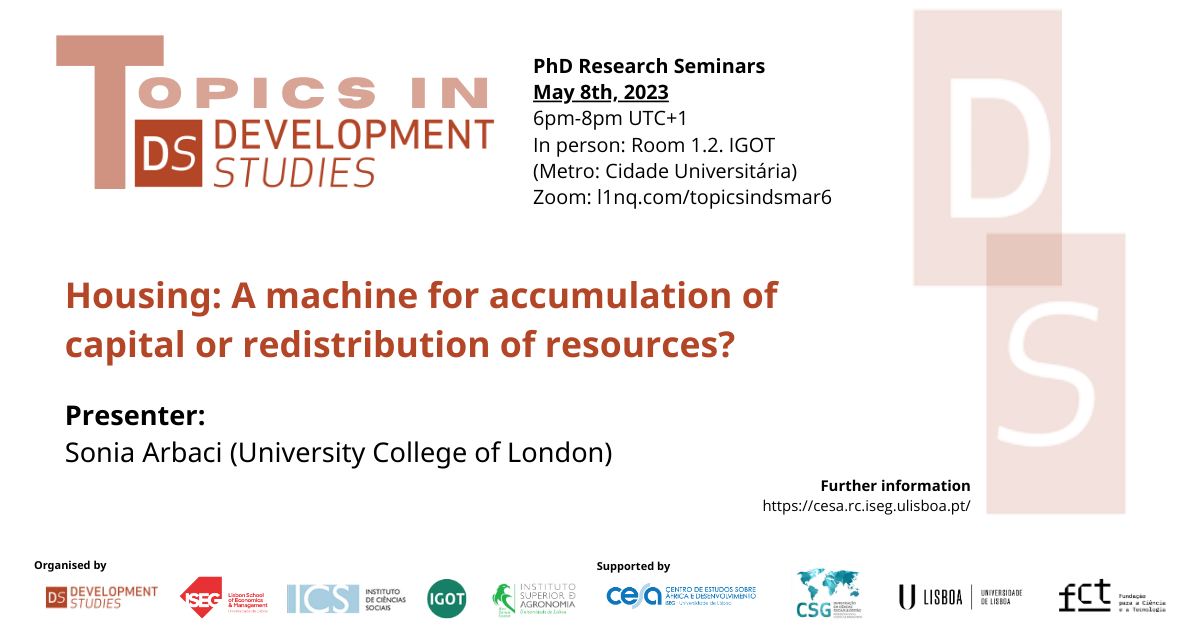
The Center for African and Development Studies (CEsA/CSG/ISEG/ULisboa) and the coordination of the PhD in Development Studies (PDED) invite you to the seventh session of the cycle of seminars “Topics in Development Studies 2023”, which will have as its theme “Housing: A machine for accumulation of capital or redistribution of resources?” and will be presented by University College London’s researcher Sonia Arbaci on May 8th, 2023, from 6 pm to 8 pm (UTC+1), at Room 1.2. at IGOT (Rua Branca Edmée Marques, Edifício IGOT, Cidade Universitária, 1600-276 Lisboa; Estação do metro: Cidade Universitária). Link Zoom: https://videoconf-colibri.zoom.us/j/97896355770?pwd=SHV5TTZoV2NZaXUxSnBoV2JOaDBnZz09.
About the event
The “Topics in Development Studies 2023” Seminars promote in-depth and advanced discussions on Development Studies and are an initiative within the scope of the PDED. The PhD is a joint program between ISEG – Lisbon School of Economics and Management, ISA – Instituto Superior de Agronomia, ICS – Instituto de Ciências Sociais, and IGOT – Institute of Geography and Land Planning.
Seminars will take place from March 6th to June 5th, 2023, always on Mondays, from 6 pm to 8 pm (UTC+1), at Room 1.2. at IGOT (Rua Branca Edmée Marques, Edifício IGOT, Cidade Universitária, 1600-276 Lisboa; Estação do metro: Cidade Universitária). The 10 sessions will be in a hybrid format (in person and online) and with free admission.
Seventh session of the “Topics in Development Studies 2023” Seminars
Theme: Housing: A machine for accumulation of capital or redistribution of resources?
Presenter: Sonia Arbaci (University College London)
Date and time: May 8th 2023 (Monday), from 6pm to 8pm (UTC+1)
Hybrid event and with free admission
In person at Room 1.2. at IGOT (Rua Branca Edmée Marques, Edifício IGOT, Cidade Universitária, 1600-276 Lisboa; Estação do metro: Cidade Universitária)
Link Zoom: https://videoconf-colibri.zoom.us/j/97896355770?pwd=SHV5TTZoV2NZaXUxSnBoV2JOaDBnZz09
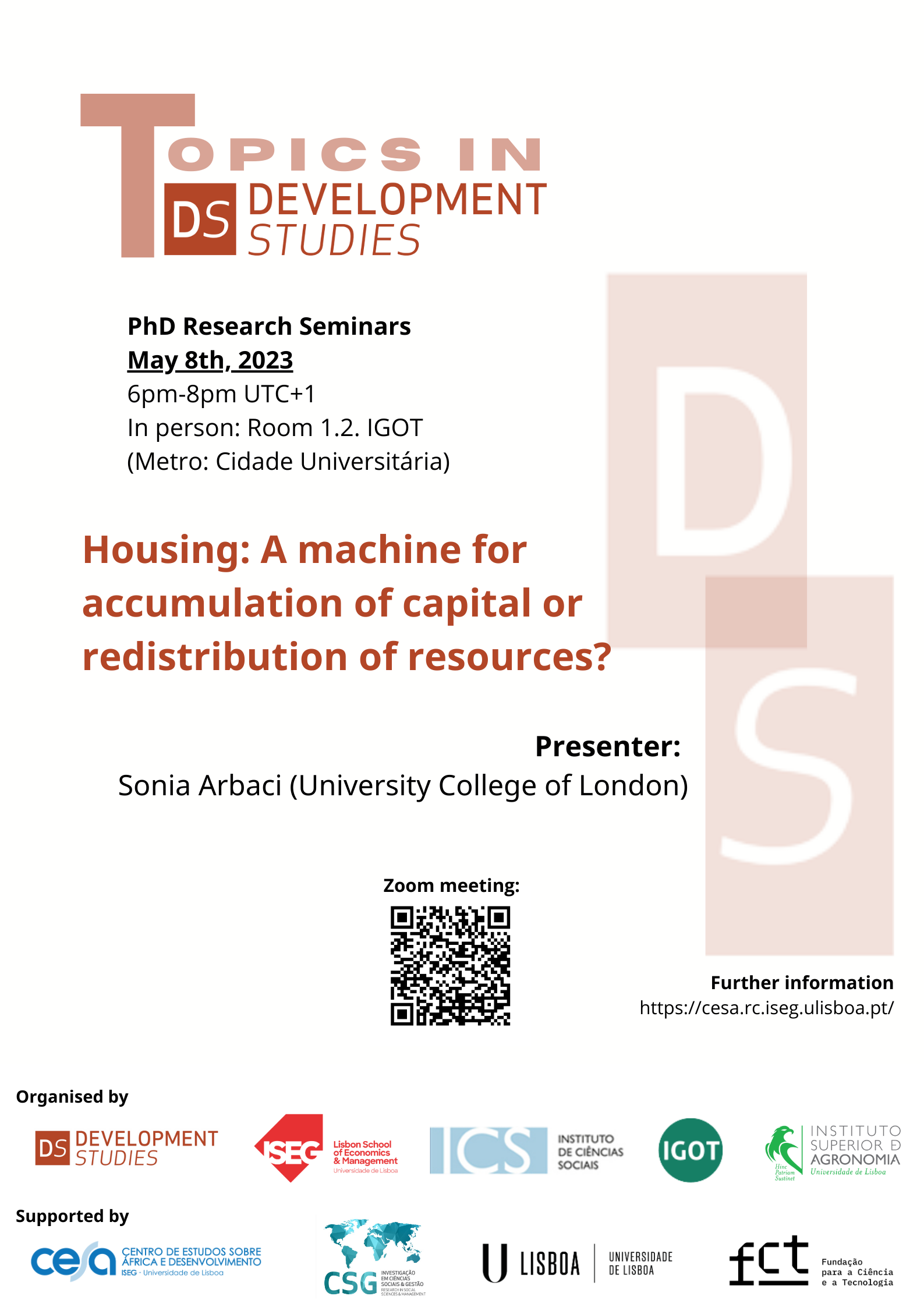
Click on the image below to access the programme
Read more:
Playlist on CEsA’s YouTube channel
Author: CEsA Communication (comunicacao@cesa.iseg.ulisboa.pt)
Image: CEsA/Reproduction

